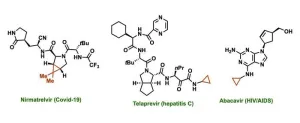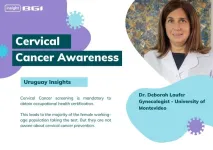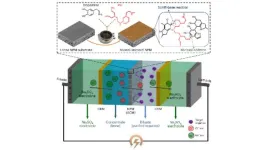(Press-News.org) Peptide YY (PYY), a hormone produced by gut endocrine cells that was already known to control appetite, also plays an important role in maintaining the balance of fungi in the digestive system of mammals, according to new research from the University of Chicago.
In a study published this week in Science, researchers found that specialized immune cells in the small intestine called Paneth cells express a form of PYY that prevents the fungus Candida albicans from turning into its more virulent form. PYY was already known to be produced by endocrine cells in the gut as a hormone that signals satiety, or when an animal has had enough to eat. The new research shows that it also functions as an antimicrobial peptide that selectively allows commensal yeast forms of C. albicans to flourish while keeping its more dangerous forms in check.
“So little is known about what regulates these fungi in our in our microbiome. We know that they're there, but we have no idea what keeps them in a state that provides health benefit to us,” said Eugene B. Chang, MD, Martin Boyer Professor of Medicine at UChicago and senior author of the study. “We now think that this peptide we discovered is actually important for maintaining fungal commensalism in the gut.”
Regulating the ‘mycobiome’
Chang and his team didn’t set to explore the fungal side of the gut microbiome, or “mycobiome” as he calls it. Joseph Pierre, PhD, a former postdoctoral scholar in Chang’s lab who is now an Assistant Professor of Nutritional Sciences at the University of Wisconsin-Madison, was studying the enteroendocrine cells in mice that produce PYY when he noticed that it was also present in Paneth cells. These are important immune system defenders in the gut of mammals, secreting several antimicrobial compounds to prevent dangerous bacteria from flourishing.
At first this didn’t make sense, because until then, PYY was only recognized as an appetite hormone. When they tested it against a variety of bacteria, it wasn’t very good at killing them either. But when they ran a computer search for other classes of peptides with a similar structure, they discovered one similar to PYY called magainin 2, which is found on the skin of the African clawed frog. This peptide protects the frogs from infection by both bacteria and fungi, so Chang’s team thought to test PYY’s antifungal properties too. As it turns out, it is not only an effective antifungal agent, but a very specific one as well.
C. albicans is a yeast that typically grows in small amounts in the mouth, on the skin, and in the intestines. The basic yeast form is commensal, or coexists peacefully in the body, but given the right conditions it transforms into what are called hyphae that branch out to form biofilms. When too much grows, it causes thrush, an infection in the mouth and throat, vaginal yeast infections, or more serious generalized infections in the body. When Chang’s team tested PYY against both forms of the fungus, it effectively prevented growth and killed the more dangerous hyphae while sparing the commensal Candida yeast.
“This is a unique example of an ‘innate’ antimicrobial peptide secreted by Paneth cells that specifically kills the virulent form of this fungi and has no effect on the on the commensal form,” Chang said.
Making the most out of your molecules
While PYY could be useful as a tool to combat fungal infections, its newly discovered function may play a role in digestive diseases as well. Patients with Crohn’s disease of the ileum, the last portion of the small intestine, often have dysfunctional Paneth cells. Chang said it’s possible that this dysfunction, and lack of PYY, could create an environment for fungi to overgrow and trigger the onset of disease.
The full, unmodified version of PYY has 36 amino acids, and when Paneth cells secrete it into the gut it’s an effective antifungal peptide. But when endocrine cells produce PYY, an enzyme clips off two amino acids to turn it into a hormone that can travel through the bloodstream and tell the brain you’re not hungry. Just like discovering its function from a frog, Chang hopes more research on this peptide will turn up more surprises.
“This is an example of the wisdom and beauty of nature that has repurposed a molecule, so it has two different functions,” he said. “That’s really cool, because this is an efficient way of making the most out of things you already have.”
The study “Peptide YY: a Paneth cell antimicrobial peptide that maintains Candida gut commensalism,” was supported by the National Institutes of Health, the Kenneth Rainin Foundation, and the University of Chicago Gastrointestinal Research Foundation. Additional authors include Brian M. Peters from the University of Tennessee; Diana La Torre, Ashley M. Sidebottom, Yun Tao, Xiaorong Zhu, Candace M. Cham, Ling Wang, Amal Kambal, Julian F. Silva, Olga Zaborina, and John C. Alverdy from the University of Chicago; Katharine G. Harris from Franklin College; Herbert Herzog from the Garvan Institute of Medical Research; Suzanne M. Noble and Jessica Witchley from the University of California-San Francisco; and Vanessa A. Leone from the University of Wisconsin – Madison.
END
A gut hormone for controlling appetite doubles as an immune regulator for the fungal microbiome
Research shows that a gut hormone called peptide YY also plays a vital role in maintaining the health of the gut microbiome by preventing helpful fungi from turning into more dangerous, disease-causing forms.
2023-08-03
ELSE PRESS RELEASES FROM THIS DATE:
New, simple and accessible method creates potency-increasing structure in drugs
2023-08-03
UNIVERSITY PARK, Pa. — Chemical structures called cyclopropanes can increase the potency and fine-tune the properties of many drugs, but traditional methods to create this structure only work with certain molecules and require highly reactive—potentially explosive—ingredients. Now, a team of researchers from Penn State has identified and demonstrated a safe, efficient and practical way to create cyclopropanes on a wide variety of molecules using a previously undescribed chemical process. With additional development, the new method—described ...
Study finds a surprising new role for a major immune regulator
2023-08-03
CAMBRIDGE, MA -- A signaling protein known as STING is a critical player in the human immune system, detecting signs of danger within cells and then activating a variety of defense mechanisms.
STING is primarily on the lookout for DNA, which can indicate either a foreign invader such as a virus or damage to the host tissue or cell. When STING detects that danger signal, it can turn on at least three different pathways — one leading to interferon production, one to non-canonical autophagy (involved in recycling cell components and clearing pathogens), and a third to formation of the inflammasome, a complex of proteins that activates ...
Winter storms over Labrador Sea influence Gulf Stream system
2023-08-03
The Gulf Stream, which brings warm water from the Gulf of Mexico to Europe and keeps the climate mild, is only part of a larger system of oceanic currents called the Atlantic Meridional Overturning Circulation, or AMOC for short. It runs through the Atlantic like a giant climate machine: as warm water from the tropics is transported northwards at the surface, the current reverses in the North Atlantic – the water cools, becomes heavier and flows south at depth.
Where exactly these sinking processes take place is the subject of current research, and recent measurement programmes have located them to the east of Greenland. ...
Doctors, medical professionals, and artificial intelligence: Innocent bystanders or vicious culprits? – a hot topic of the AI & Medicine 2024 World Congress in Paris, France
2023-08-03
Paris, France – August 3, 2023 – The First International Congress on Artificial Intelligence and Medicine, AI & Medicine 2024, is set to take place on April 11-12, 2024, in Paris, France. Building on the success of IA & Néphrologie 2023, the conference aims to bridge the gap between cutting-edge technology and health care.
AI & Medicine 2024 aims to inform medical professionals about the capabilities of advanced machine learning techniques, and simultaneously raise awareness within the tech industry regarding the unique challenges and requirements of the healthcare sector. The congress will offer a platform to discuss the current applications of AI in diagnostics, ...
A spinout’s biggest competitor may be the parent company, not other entrepreneurs
2023-08-03
Spinouts, or new ventures started by employees leaving a parent firm, often outperform other types of new firms. But a new study published in Strategic Management Journal finds that when parent firms identify and implement ideas internally, they outperform spinouts. For example, if employees at Microsoft leave the parent and start their own spinout in the competing industry, the spinout potentially needs to compete against a new establishment formed by Microsoft in the same industry.
New ventures by former employees often have an edge over competitors because of the knowledge transfer from their ...
FSU researcher finds potential new tool for early identification of dementia risk
2023-08-03
Research at the Florida State University College of Medicine has identified a potential low-cost method for predicting if a person is at risk of developing dementia.
By analyzing data from nearly 13,000 subjects who participated in a long-term aging study, researchers found that an interviewer’s rating of a cognitively healthy person’s memory successfully predicted the likelihood of developing dementia over a 15-year period. Their findings will be published in the Journal of Alzheimer’s Disease.
“Our findings show that interviewers ...
Current takes a surprising path in quantum material
2023-08-03
ITHACA, N.Y. -- Cornell researchers used magnetic imaging to obtain the first direct visualization of how electrons flow in a special type of insulator, and by doing so they discovered that the transport current moves through the interior of the material, rather than at the edges, as scientists had long assumed.
The finding provides new insights into the electron behavior in so-called quantum anomalous Hall insulators and should help settle a decades-long debate about how current flows in more general quantum Hall insulators. These insights will inform the development of topological materials for next-generation quantum devices.
The team’s paper, “Direct ...
Professor Deborah Laufer discusses barriers to cervical cancer screening in Uruguay – BGI Insights
2023-08-03
The recently released BGI Genomics 2023 Global State of Cervical Cancer Awareness Report highlights the level of knowledge, attitudes, and practices related to cervical cancer screening and the human papillomavirus (HPV) on a global scale.
Dr. Deborah Laufer, a gynecologist and Associate Professor at the Faculty of Medicine in the University of Montevideo, offers her insights on this report's findings and the steps needed to improve cervical cancer awareness in Uruguay.
Q: 40% of respondents worldwide did not choose HPV as the key cause of cervical cancer. 37% in Uruguay did not mention it either. ...
Researchers strengthen defenses against common cyberattack
2023-08-03
RICHLAND, Wash.—Scientists have developed a better way to recognize a common internet attack, improving detection by 90 percent compared to current methods.
The new technique developed by computer scientists at the Department of Energy’s Pacific Northwest National Laboratory works by keeping a watchful eye over ever-changing traffic patterns on the internet. The findings were presented on August 2 by PNNL scientist Omer Subasi at the IEEE International Conference on Cyber Security and Resilience, where the manuscript was recognized as the best research paper presented at the meeting.
The ...
Mussel-inspired membrane can boost sustainability and add value to industrial wastewater treatment
2023-08-03
Engineers have developed a new kind of membrane that separates chemicals within wastewater so effectively that they can be reused, presenting a new opportunity for industries to improve sustainability, while extracting valuable by-products and chemicals from wastewater.
Created for use in wastewater treatment, the thin-film composite nanoporous membrane known as a TFC NPM, exhibits an ‘unprecedented’ capability to separate salts and other chemical components from water, and could lead to more sustainable treatment and management of water in a range of industries.
A research ...
LAST 30 PRESS RELEASES:
Stem cells from human baby teeth show promise for treating cerebral palsy
Chimps’ love for crystals could help us understand our own ancestors’ fascination with these stones
Vaginal estrogen therapy not linked to cancer recurrence in survivors of endometrial cancer
How estrogen helps protect women from high blood pressure
Breaking the efficiency barrier: Researchers propose multi-stage solar system to harness the full spectrum
A new name, a new beginning: Building a green energy future together
From algorithms to atoms: How artificial intelligence is accelerating the discovery of next-generation energy materials
Loneliness linked to fear of embarrassment: teen research
New MOH–NUS Fellowship launched to strengthen everyday ethics in Singapore’s healthcare sector
Sungkyunkwan University researchers develop next-generation transparent electrode without rare metal indium
What's going on inside quantum computers?: New method simplifies process tomography
This ancient plant-eater had a twisted jaw and sideways-facing teeth
Jackdaw chicks listen to adults to learn about predators
Toxic algal bloom has taken a heavy toll on mental health
Beyond silicon: SKKU team presents Indium Selenide roadmap for ultra-low-power AI and quantum computing
Sugar comforts newborn babies during painful procedures
Pollen exposure linked to poorer exam results taken at the end of secondary school
7 hours 18 mins may be optimal sleep length for avoiding type 2 diabetes precursor
Around 6 deaths a year linked to clubbing in the UK
Children’s development set back years by Covid lockdowns, study reveals
Four decades of data give unique insight into the Sun’s inner life
Urban trees can absorb more CO₂ than cars emit during summer
Fund for Science and Technology awards $15 million to Scripps Oceanography
New NIH grant advances Lupus protein research
New farm-scale biochar system could cut agricultural emissions by 75 percent while removing carbon from the atmosphere
From herbal waste to high performance clean water material: Turning traditional medicine residues into powerful biochar
New sulfur-iron biochar shows powerful ability to lock up arsenic and cadmium in contaminated soils
AI-driven chart review accurately identifies potential rare disease trial participants in new study
Paleontologist Stephen Chester and colleagues reveal new clues about early primate evolution
UF research finds a gentler way to treat aggressive gum disease
[Press-News.org] A gut hormone for controlling appetite doubles as an immune regulator for the fungal microbiomeResearch shows that a gut hormone called peptide YY also plays a vital role in maintaining the health of the gut microbiome by preventing helpful fungi from turning into more dangerous, disease-causing forms.





